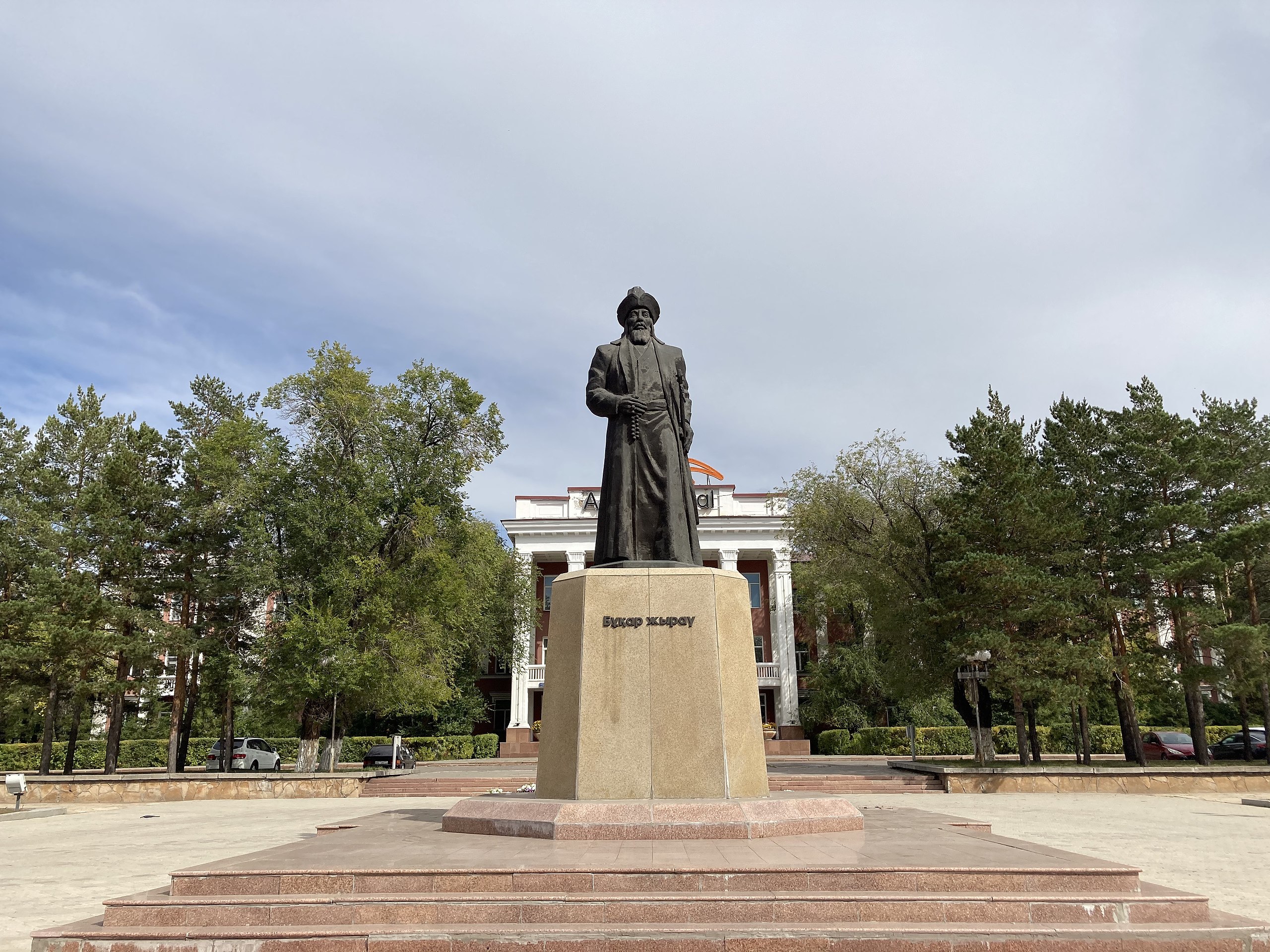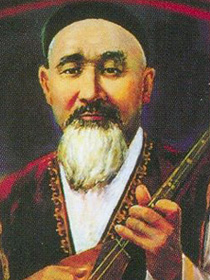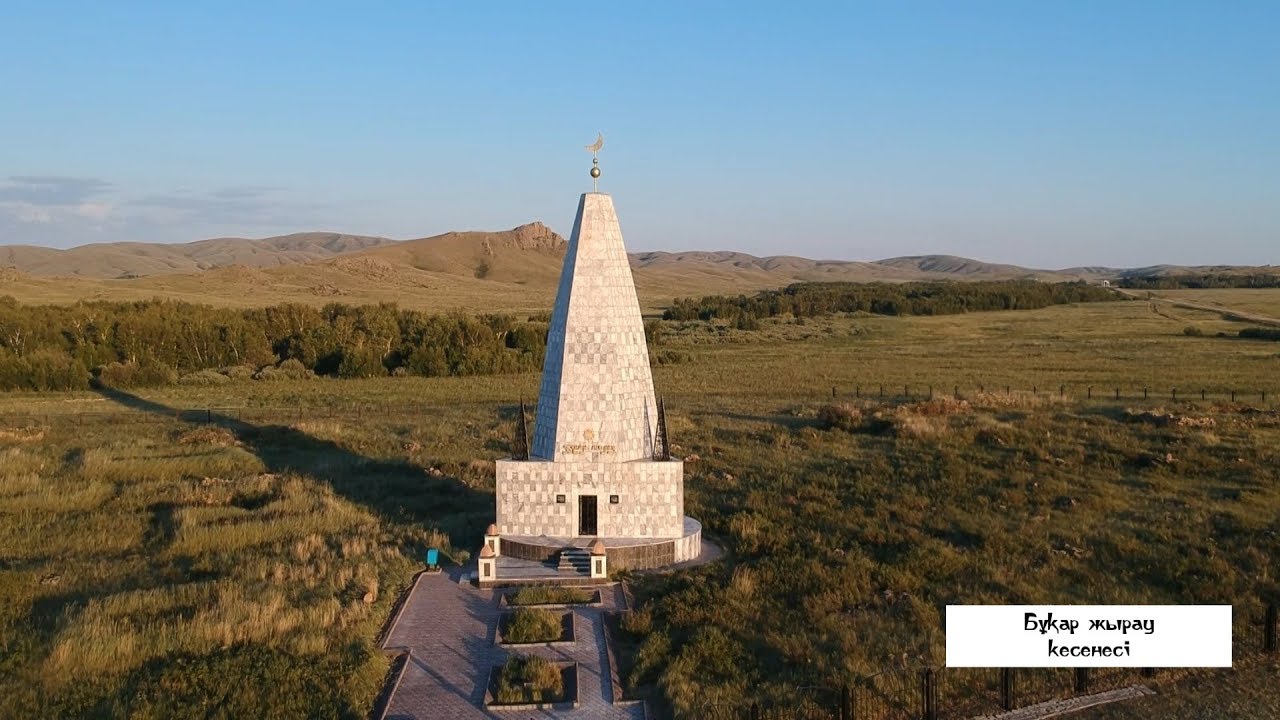ASTANA – Constitution Day on Aug. 30 offers an opportunity to commemorate Bukhar Kalkamanuly, commonly known as Bukhar Zhyrau. He was not only a folk singer and improviser but also a key contributor to Kazakhstan’s first code of laws, Zheti Zhargy (Seven Charters). This year marks the 355th anniversary of his birth.

Bukhar zhyrau’s monument in Karagandy. Photo credit: Talgautb/wikipedia.org.
Bukhar Zhyrau also served as an advisor to Abylai Khan, who foresaw threats from neighboring powers and warned against disunity among Kazakh tribes.
As a true polymath—an increasingly rare breed in today’s world—Bukhar Zhyrau witnessed firsthand the challenges posed by the Russian Empire and the Dzungars to the 18th-century Kazakh Khanate. His intellectual and rhetorical skills significantly influenced the ideology of the Khanate during Abylai Khan’s reign.
His early life

Bukhar zhyrau. Photo credit: e-history.kz.
Bukhar Zhyrau was born in 1668 in a place called Bayanauyl in the Pavlodar Region. His father, Kalkaman batyr (warrior), was well-known for his exploits against the Dzungars.
Educated in the madrasas of Bukhara and Damascus, Bukhar Zhyrau was not only well-versed in civil rights but also a respected bi (noble judge) and statesman.
He played a critical role in compiling the first Kazakh code of laws, Zheti Zhargy, along with other prominent bis – Tole bi, Kazybek bi, and Ayteke bi. This legal code was adopted during Tauke Khan’s reign.
Bukhar Zhyrau’s expertise was crucial in forming norms for administrative, criminal, and civil laws, land-use rules, as well as sections on taxes and family relations.
He was intelligent, sharp on the tongue and wise. People often said of him that he went “from commoner to khan” and “from darkness to light.”
His service to Abylai Khan
More than three centuries ago, Bukhar Zhyrau warned Abylai Khan about various threats facing the Kazakh nation during a tumultuous period of conflicts and challenges. The 18th-century Kazakh steppe was a hotbed of political infighting among local tribes, compounded by constant attacks from the Dzungars and the rising influence of neighboring powers like the Russian Empire and the Chinese Qing Dynasty.

Bukhar zhyrau mausoleum at the foot of the mount Dalba in Bukhar zhyrau district of the Karagandy Region. Photo credit: life09.kz.
In these challenging circumstances, Abylai Khan’s mission was to reunify Kazakh territories while balancing relations with the three major powers. Bukhar Zhyrau’s straightforward and honest approach won him lasting respect from the public and Abylai Khan. His eloquence helped shape Abylai Khan’s vision.
Recognizing the constraints of harboring animosity towards the Russians, Bukhar Zhyrau advised Abylai Khan on the importance of maintaining good relations, as reflected in the following verse (loosely translated by the author):
“Don’t be angry with resentment,
Don’t spew bile,
Don’t think of enmity with the Russians,
Think of your long-suffering people.”
He had a sharp political insight and was invaluable to Abylai Khan because he recognized the importance of keeping peace with the three powers and the necessity of overcoming tribal disunity to preserve the country’s unity.
Bukhar Zhyrau’s poem “Sabalak” captures Abylai’s ascension to the position of Khan in 1734 and celebrates his virtues as a wise ruler and skillful commander.
Bukhar Zhyrau’s legacy
Only around 1,200 lines of Bukhar Zhyrau’s poetry have survived to the present day, recorded by his contemporaries and collected by his grandson at the end of the 19th century. Historians, ethnographers, and orientalists such as Mashhur Zhusip Kopeyev, Shokan Ualikhanov, Saken Sefullin, Sabit Mukanov and Mukhtar Auezov have dedicated their work to studying and preserving Bukhar Zhyrau’s poems and literary works.
Bukhar Zhyrau is buried at the foot of Mount Dalba in the Bukhar Zhyrau district of the Karagandy Region. In 1993, a mausoleum featuring three pillars and a crescent moon atop its dome was erected to commemorate the 325th anniversary of his birth. In 2008, a monument honoring him was unveiled in the city of Karagandy.

